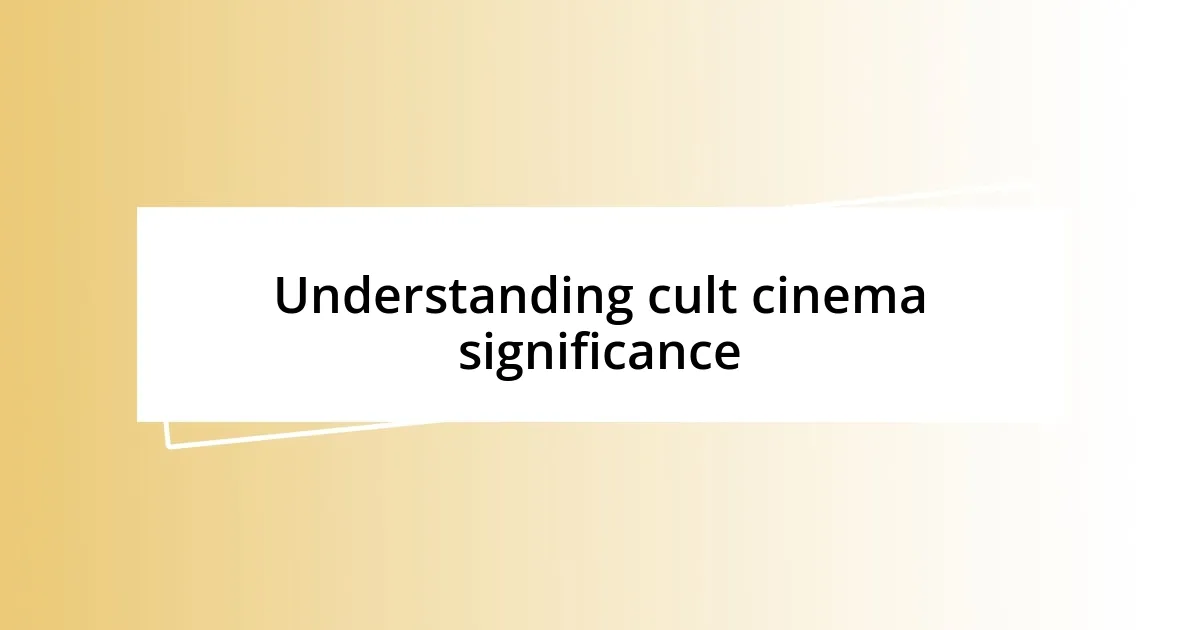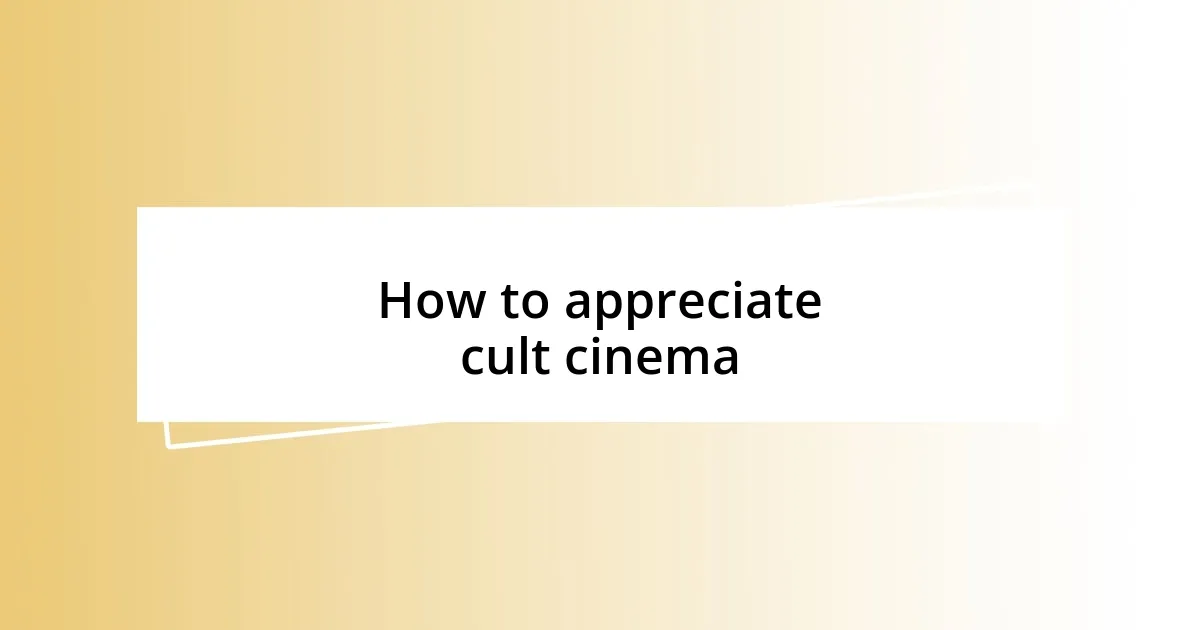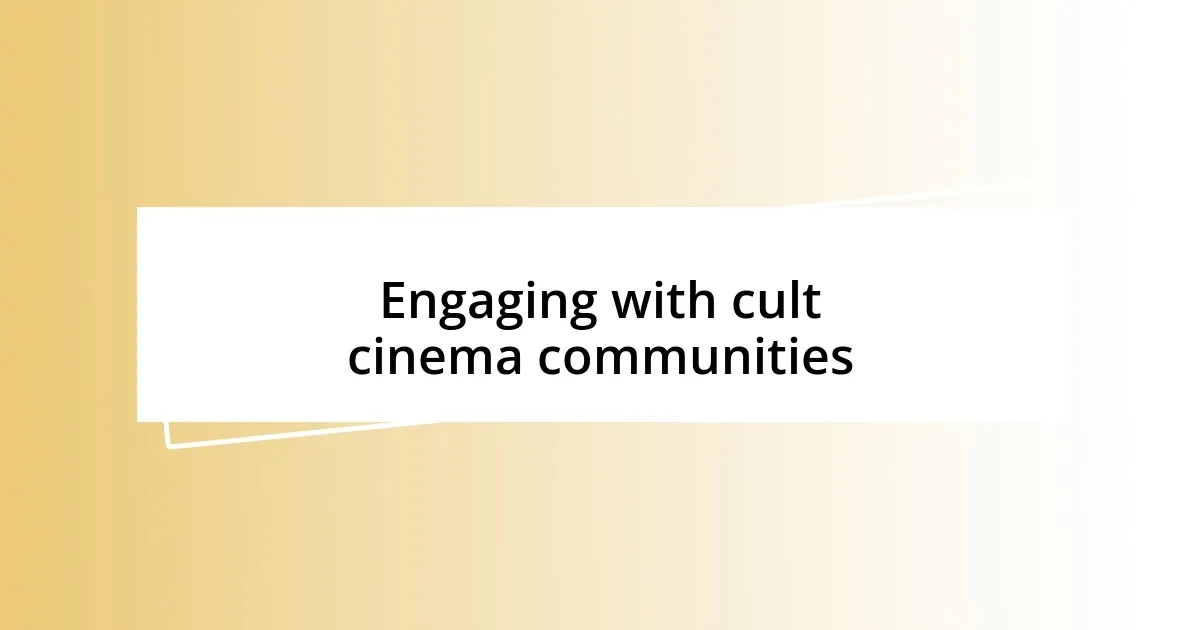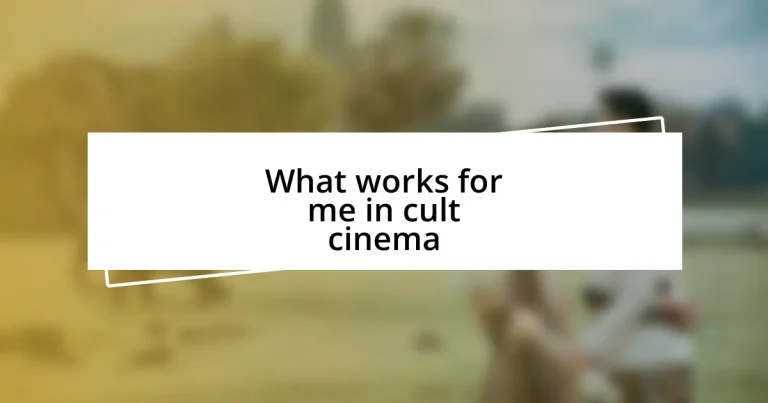Key takeaways:
- Cult cinema fosters tight-knit communities, sparking deep discussions and emotional connections among fans.
- Characteristics of cult films include non-linear storytelling, unconventional characters, and provocative themes that challenge societal norms.
- Key filmmakers like David Lynch, John Waters, and Quentin Tarantino have significantly shaped cult cinema with their unique storytelling styles and boundary-pushing narratives.
- Engagement with cult cinema is enhanced through shared experiences at screenings, online communities, and local events, creating a sense of belonging among enthusiasts.

Understanding cult cinema significance
Cult cinema holds a unique position in the film landscape, often celebrating the unconventional and the marginalized. I remember the first time I stumbled upon a midnight screening of “The Rocky Horror Picture Show.” The audience’s energy was infectious, transforming a simple film viewing into an engaging, interactive experience. It made me wonder: how often do we find ourselves in spaces where creativity and rebellion are celebrated so openly?
What strikes me most about cult films is their ability to forge tight-knit communities around shared passions. The moment I joined a forum dedicated to discussing David Lynch’s works, I felt an instant connection with fellow fans who viewed his films not just as entertainment but as profound reflections of the human psyche. Isn’t it fascinating how a seemingly niche interest can unite people from all walks of life, sparking discussions that often go deep into personal interpretations and emotional responses?
Moreover, the significance of cult cinema often lies in its defiance of mainstream norms. Films like “Eraserhead” or “Pink Flamingos” challenge societal expectations, inviting audiences to reflect on themes often considered taboo. I find it exhilarating to watch something so raw and unfiltered, which pushes me to think outside conventional boundaries. Have you ever experienced a film that made you question societal norms in a way you never expected? That’s the power of cult cinema—transformative and thought-provoking, urging us to confront our own beliefs.

Characteristics of cult films
Cult films often share certain characteristics that set them apart from mainstream cinema. One thing I’ve noticed is their penchant for quirky narratives and unique visual styles. For instance, I recall watching “Donnie Darko” for the first time and being captivated by its blend of science fiction and psychological thriller elements. The way the story unfolded felt so unpredictable, keeping me on the edge of my seat and prompting deep reflections long after the credits rolled.
Here’s a closer look at the defining traits of cult films:
- Non-linear storytelling: Many cult films eschew traditional plot structures for something more complex and thought-provoking.
- Strong subcultures: They often foster vibrant communities that celebrate and dissect the film’s themes and characters.
- Unconventional characters: Relatable yet eccentric protagonists challenge typical archetypes, making viewers question societal norms.
- Provocative themes: Cult films tend to explore taboo subjects, sparking intense discussions and personal reflections among audiences.
- Aesthetic experimentation: From peculiar cinematography to bold editing choices, they often prioritize artistic expression over commercial viability.
Reflecting on these traits, I remember discovering “The Room” during a film night with friends. What started as a casual viewing quickly morphed into a hilarious commentary session, where we laughed and cringed at its peculiarities. It’s these shared experiences that highlight the distinct charm of cult cinema, creating moments that linger in our memories.

Popular cult cinema genres
Cult cinema encompasses a variety of genres, each boasting a unique flair that resonates deeply with fans. For instance, horror films like “Evil Dead” have garnered a dedicated following due to their blend of humor and terror. I still recall that gut-busting laughter combined with moments of sheer fright during a late-night viewing with my friends—it was one wild rollercoaster of emotions. Watching these films creates a communal bond as we cheer, scream, or laugh together, reinforcing the joy of shared experiences.
Another genre thriving in the cult realm is science fiction, where films like “Blade Runner” challenge our perceptions of humanity and technology. What I love most about cult sci-fi is how it invites viewers to ponder reality and the future. I vividly remember debating the film’s themes over coffee with a group of fellow fans, each perspective adding depth to my understanding of the film. Community discussions like this often elevate the experience, making us feel part of something larger.
Lastly, don’t overlook the charm of musicals in cult cinema. “The Rocky Horror Picture Show,” for example, has transcended generations, turning screenings into lively sing-along events. I’ll never forget my first midnight showing, where the audience’s enthusiastic participation transformed a film into an electrifying spectacle. There’s something magical about belting out songs alongside a room full of strangers who feel like instant friends.
| Genre | Notable Film |
|---|---|
| Horror | Evil Dead |
| Science Fiction | Blade Runner |
| Musical | The Rocky Horror Picture Show |

Key filmmakers in cult cinema
One of the standout figures in cult cinema is David Lynch. His films, like “Blue Velvet” and “Mulholland Drive,” frequently dive into the surreal, leaving viewers questioning reality. I remember the first time I watched “Eraserhead”; I felt a mix of anxiety and fascination, as Lynch’s unique style challenged the way I viewed storytelling. Have you ever watched a film that felt like a dream you couldn’t quite understand? That’s the essence of Lynch’s work—provocative and deeply cerebral.
Similarly, John Waters has carved out his own niche with films like “Pink Flamingos” and “Hairspray,” offering a celebration of campiness and transgression. While watching “Pink Flamingos,” I was struck by its audacity; Waters doesn’t shy away from pushing boundaries. I still chuckle when I think about the film’s outrageous moments and how it ignites conversations about taste vs. art. Isn’t it exhilarating how Waters encourages us to embrace the bizarre parts of our lives?
Then there’s Quentin Tarantino, whose distinct storytelling methods have garnered a fiercely loyal following. Films like “Pulp Fiction” and “The Rocky Horror Picture Show” have not only changed the landscape of cinema but also set cult film standards with their intertwined narratives and iconic dialogue. Reflecting on my experience watching “Kill Bill” with friends, I remember how we reveled in its unapologetic violence and stylistic choices. Tarantino’s work makes you think about the nature of storytelling itself—don’t you love how his films challenge our expectations and provoke lively discussions?

How to appreciate cult cinema
Cult cinema invites viewers to immerse themselves in its unique energy, which is often characterized by its quirky narratives and passionate fanbases. I’ve found that approaching these films with an open mind can make all the difference. Imagine sitting down for a movie you’ve heard is bizarrely captivating—embracing the strangeness rather than questioning it allows you to experience the film on a deeper level.
Engaging with cult cinema often involves connecting with a broader community of enthusiasts. During a weekend film festival dedicated to cult classics, I was amazed at how strangers quickly became friends over shared laughs and gasps. Isn’t it interesting how certain films, like “The Room,” create an atmosphere where quoting lines and reenacting scenes becomes a rite of passage among fans? This camaraderie enhances the magic of the viewing experience, making each film feel like a cultural event.
Lastly, I believe that revisiting films can often lead to new revelations. I still relish my re-watch of “Donnie Darko” years after my first viewing; the layers of meaning struck me in ways I hadn’t considered before. Have you ever experienced that? Discovering new elements or appreciating the craftsmanship behind a cult classic can transform how you see not only the film but also the genre as a whole. It’s like peeling back the layers of an onion, realizing there’s much more to appreciate than you first thought.

Engaging with cult cinema communities
Cult cinema communities thrive on shared passion and unique experiences that transcend conventional movie-watching. I remember attending a midnight screening of “The Rocky Horror Picture Show,” where the energy in the room was palpable. People dressed up, shouted lines, and participated in callbacks—it felt less like watching a film and more like being part of a joyous celebration. Isn’t it amazing how these moments can forge connections between complete strangers, uniting us through our shared love for the bizarre?
Exploring online forums and social media groups has also been a revelation for me. I recall joining a Facebook group dedicated to obscure horror films, where I found myself swapping recommendations and discussing hidden gems. The excitement of discovering a film that others had hyped up was like unearthing a treasure. Have you ever felt that rush when someone shares an obscure title you’ve never heard of? Engaging in these communities not only expands my film knowledge but also creates a sense of belonging that’s hard to replicate elsewhere.
Participating in local cult film events is another exciting avenue for deepening connections. I once visited a pop-up exhibit celebrating “The Big Lebowski,” and it was fascinating to see how fans interpreted the Coen brothers’ work. The art on display and the enthusiasm attendees showed for their favorite scenes created a vibrant atmosphere. Doesn’t it feel special when a film you love inspires so much creativity? Engaging with these communities allows us to explore cult cinema on multiple levels, fostering a rich tapestry of dialogue and connection.








